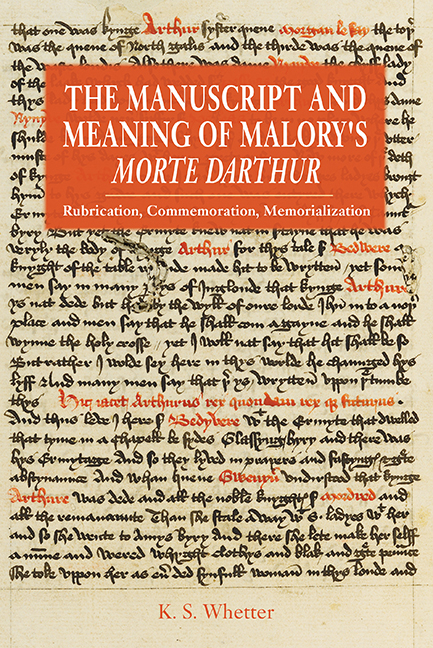Book contents
- Frontmatter
- Dedication
- Contents
- List of Plates
- Acknowledgements
- Abbreviations
- A Note on the Text
- A Textual Introduction
- 1 The Unusual Nature of Winchester's Rubrication
- 2 Tracing Winchester's Rubrication and Marginalia
- 3 Malory's Sacralized Secularity
- 4 Rubricated Elegy
- Conclusion: The Red and the Black
- Bibliography
- Index
- Miscellaneous Endmatter
3 - Malory's Sacralized Secularity
Published online by Cambridge University Press: 28 April 2017
- Frontmatter
- Dedication
- Contents
- List of Plates
- Acknowledgements
- Abbreviations
- A Note on the Text
- A Textual Introduction
- 1 The Unusual Nature of Winchester's Rubrication
- 2 Tracing Winchester's Rubrication and Marginalia
- 3 Malory's Sacralized Secularity
- 4 Rubricated Elegy
- Conclusion: The Red and the Black
- Bibliography
- Index
- Miscellaneous Endmatter
Summary
My overarching thesis in this study is that there is a marked correlation between the central narrative themes of Sir Thomas Malory's Le Morte Darthur and the physical layout of that text in its manuscript context in the Winchester manuscript, that Winchester's rubrication pattern is unique, and that the most likely source for Winchester's layout is Malory himself rather than a scribe, patron, reader or printer. Winchester's consistent rubrication of names and its marginalia recording seemingly random knightly deeds all reinforce Malory's predominant focus on the earthly values of knighthood, love and fellowship, and worshyp. Even in the ‘Tale of the Sankgreal’ Malory sacralizes secular chivalry.
My reading of the Morte Darthur runs counter to those many critics who argue that Malory eventually castigates chivalry, or that his true focus is religion. D. Thomas Hanks Jr, for instance, claims that Malory and his Arthuriad are deeply religious and that this religiosity is announced by ‘six of the more noticeable section breaks’ in the Morte, intrusive passages where Malory ‘emphasize[s] his Christian understanding of the world’. I will examine these breaks and other prayers below, but it is worth pausing for a moment to compare this aspect of Morte Darthur to the Canterbury Tales and Chaucer's Retraction. Although modern critics are divided on the sincerity and purpose of the Retraction, it is noteworthy that Chaucer explicitly laments his ‘unkonnynge’, announces his intended ‘penitence, confessioun and satisfaccioun’, and issues his revocation and retraction of a good many of his works, especially those of his tales ‘that sownen into synne’. Malory, in marked contrast, takes nothing back in his explicits: he merely asks for release. Religion is present at times in the Morte, but knighthood is omnipresent; and Malory never denounces his subject or narrative as sinful.
There are certainly many uses of the word pray in Malory's Arthuriad, and many of these uses are religious.
- Type
- Chapter
- Information
- The Manuscript and Meaning of Malory's Morte DarthurRubrication, Commemoration, Memorialization, pp. 117 - 174Publisher: Boydell & BrewerPrint publication year: 2017



